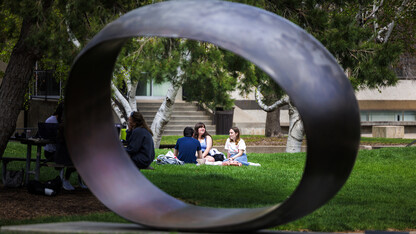· 10 min read
Nebraska in the national news: July 2020

The scientific expertise of two University of Nebraska–Lincoln faculty members was featured in prominent national news outlets in July. The stories were among 35-plus featuring Husker faculty, staff, students, centers and programs during the month.
Shab Mohammadi, postdoctoral research associate in the School of Biological Sciences, was interviewed for a July 3 New York Times article on a recent study showing that caecilians’ mouths might be rimmed with venom-tipped teeth, like those found in some snakes — the first time venom glands have been found in an amphibian’s mouth. Mohammadi said caecilians independently stumbling upon the strategy would be “really interesting and remarkable,” however it’s still unclear how noxious the gland’s contents are or how toxic they are to the insects and worms that caecilians consume.
David Harwood, professor and Stout Chair in stratigraphy, was interviewed for a July 22 National Geographic article on a new study showing that the East Antarctic ice sheet may be even more vulnerable to warming than once believed. The study suggests that a large part of the ice sheet collapsed only 400,000 years ago, during a time period when the amount of carbon dioxide in the atmosphere peaked at about 300 parts per million. Carbon dioxide levels currently sit at 410 ppm.
“This doesn’t bode well for the future,” Harwood said.
More coverage:
P. Stephen Baenziger, agronomy and horticulture, has received a $650,000 grant through the U.S. Department of Agriculture’s National Institute of Food and Agriculture program for a project that has the potential to improve wheat productivity through the development of hybrid wheat varieties. Stories on the grant have appeared in KLKN, the Nebraska City News-Press, Fence Post and Seed Today.
Karla Wilke, a cow-calf systems and stocker management specialist with Nebraska Extension, wrote a recent UNL BeefWatch article offering tips for managing cows through dry conditions. BEEF magazine ran the article July 6.
A recent study led by Luwen Zhang, biological sciences, has found that an overabundance of B lymphocytes infected with the Epstein-Barr virus contributed to the recurrence of multiple sclerosis-like symptoms in mice. Medical Xpress ran a July 6 article on the research.
Hunter Flodman, chemical and biomolecular engineering, was interviewed for a July 7 Fast Company article on a recent recall of hand sanitizer that may contain methanol. Ethanol is “the key ingredient that kills viruses and other germs. It disrupts the protective layer around the virus and kills it almost instantly,” Flodman said. “Methanol is probably cheaper, and it’s available.”
Erin Laborie, Nebraska Extension beef educator, was interviewed for a July 7 Brownfield Ag News story on heat stress in cattle. She said two key strategies for mitigating heat stress are making sure cattle have plenty of water and providing shade if possible.
A recent article by Steve Niemeyer, Nebraska Extension educator, and Travis Mulliniks, animal science, was highlighted in a July 7 BEEF magazine column on the pros and cons of creep feeding calves during the summer grazing months. “Creep feeding calves can be a good return on investments in certain situations,” they wrote. “Maintaining the calf’s efficiency at an early age is becoming much more critical with modern market requirements.”
Brian Stelzer, assistant director of sports clubs and youth activities with Campus Recreation, was interviewed for a July 8 Campus Rec Magazine article on risk management with club sports. He said staff sends a packet with each team that includes a concussion recognition guide, accident reports, emergency contacts and Stelzer’s phone number. Clubs can check out fully stocked first aid bags. In addition, at least two members of every club must be certified in CPR/AED/first aid.
Chancellor Ronnie Green was featured in a July 9 247Sports story on the Big Ten moving to conference-only schedules for fall sports. He said he was happy the conference has a direction for potentially having athletics in the fall but said there was still plenty of work to do.
James Le Sueur, history, wrote a July 11 guest column for the Los Angeles Review of Books on his new documentary, “The Art of Dissent.” The film explores the Velvet Revolution in Czechoslovakia.
Chigozie Obioma, English, a celebrated author, recently compiled a playlist for PEN America’s Just Press Play series.
Tamra Jackson-Ziems, plant pathology, provided an update on plant diseases in Nebraska for a recent Market Journal video. RFD-TV aired the video July 13.
Jackson-Ziems and Jenny Rees, Nebraska Extension educator, were featured in a July 20 Successful Farming article on Southern corn rust moving north and west, into southern Nebraska. “Fields in this area and elsewhere (especially in southern Nebraska) should be monitored frequently in the coming weeks for Southern rust development,” they wrote. “Due to low disease incidence and severity, we are not recommending fungicide applications for control at this time. We recommend scouting fields.”
Jody Green, an urban entomologist with Nebraska Extension, was interviewed for a July 14 MSN.com article on how to prevent and treat chigger bites. She recommended avoiding bites by wearing long pants, long sleeves, shoes or boots and tucking clothing; wearing permethrin-treated clothing and DEET (25-30%) on the skin; avoiding sitting directly in the grass; and keeping lawns and bushes trimmed. Green said people who have been in a chigger-infested area should take a shower upon returning home and put clothes in a dryer on high heat for 30 minutes.
Green was also interviewed for a July 21 MSN.com article on how to tell the difference between chigger and scabies bites. “Chiggers are ectoparasites, so they bite and feed on the outside of the body,” she said. “Scabies mites burrow under the surface of the skin.”
Amanda Most, a junior agricultural education major at Nebraska, discussed her Rural Futures Institute fellowship in Wahoo for a July 14 segment on RFD-TV. Helen Fagan, agricultural leadership, education and communication, and program director, was also featured in the segment.
Susan Harris, Nebraska Extension educator for rural health, wellness and safety, was interviewed for a recent Prairie Health Publishing story on the importance of sleep. Harris discussed some of the benefits of adequate sleep and dangers of not getting enough. She recommended people maintain a healthy circadian rhythm by getting up at the same time each day, awakening to bright light and dimming the lights at night, and sleeping in a cool environment. The Capital Journal in Pierre, South Dakota, ran the article July 14.
Joe Louis, entomology, has received a $430,000 grant from the U.S. Department of Agriculture for research that could lead to a better understanding of sorghum’s natural defenses against fall armyworm. The Fence Post ran a July 15 article on the research.
Husker students Xavier Ho, a senior economics major, and Aishwinie Pillai, a senior actuarial science major, were interviewed for a July 16 article in The Star on Malaysian students in the United States feeling “used” by the Trump administration after it introduced and revoked within days a policy that would have sent international students back to their home countries if their classes are online-only. Pillai said it was a stressful time for many international students because they had to plan for all possible outcomes.
Chris Calkins, animal science, was featured in a July 17 article in The Hustle on the flat iron steak’s journey from lab to table. With $1.5 million in grant funding from the National Cattlemen’s Beef Association, Calkins and the University of Florida’s Dwain Johnson discovered the new steak — a thin, tender cut from beneath the shoulder blade of the cow — in 2001.
Elsbeth Magilton, executive director of technology, security and space law initiatives, was the first to correctly answer POLITICO Space’s question of the week in mid-July. She answered that four space agencies have successfully sent spacecraft to Mars: from the United States, Soviet Union, India and European Space Agency.
Dale Grotelueschen, director of the Great Plains Veterinary Education Center, was interviewed for a July 17 Fence Post article on pinkeye in cattle. “Experienced veterinarians and producers know that early treatment is highly important when cases begin to occur in order to avoid severe complications,” he said.
Faculty are collaborating with Husker alumnus and industry veteran Bob Hall on a series of coronavirus-themed comics that aim to inform middle and high school students about the virus and help combat misconceptions among the public at large. SINC published a July 20 article on the comic series.
Amy Schmidt, biological systems engineering, discussed how manure can improve the resilience of crop land during the virtual Nebraska Pork Expo. National Hog Farmer published a July 22 article on the topic.
Humberto Blanco, soil management and soil physics, and his team have received $1 million in grant funding from the U.S. Department of Agriculture’s National Institute of Food and Agriculture program for two projects designed to enhance the productivity and health of environmentally sensitive soils. The Fence Post and Seed Today ran articles on the projects.
A team of researchers and wireless technology experts from the university and the city of Lincoln, along with community, industry and university partners, has been selected as a finalist to lead a prestigious National Science Foundation research program focused on studying novel ways to reduce the cost of broadband delivery to rural communities. Stories on the announcement appeared in the Lincoln Journal Star, TechCrunch and a few other media outlets.
Jill O’Donnell, director of the Clayton Yeutter Institute of International Trade and Finance, discussed a recent report on Nebraskans’ views of foreign policy for a July 29 segment on RFD-TV. The report was released May 21 by the Carnegie Endowment for International Peace. It was developed in partnership with Nebraska’s Bureau of Business Research and Yeutter Institute, along with the University of Nebraska Public Policy Center.
Glennis McClure, associate extension educator with Nebraska Extension, and Susan Harris, Nebraska Extension educator for rural health, wellness and safety, were interviewed for a July 29 Midwest Messenger article on resources to help farmers deal with pandemic-related stress. Shutdowns have resulted in lower corn and soybean demand, McClure said. They have also impacted family members who work off-farm through employment changes, she said. “A large (stressor) during the school year was dealing with children at home while keeping up with farm work,” Harris said.
Brent Plugge, Nebraska Extension educator, and Brian Vander Ley, assistant professor at the Great Plains Veterinary Education Center, were quoted on the clinical signs of pinkeye in cattle for a July 29 BEEF magazine blog entry.
Deirdre Cooper Owens, history, director of the Humanities in Medicine program, was interviewed for a July 30 Montgomery Advertiser article on the legacy of J. Marion Sims, a doctor who experimented on enslaved women who could not consent. By repairing the women’s reproductive organs, she said, Sims was ensuring that the white men who owned the women had access to enslaved children. The story was part of the USA Today Network’s Confederate Reckoning series.
Midwest Messenger published a July 30 article on three agricultural inventions by Husker researchers recently receiving U.S. patents. The projects involve soybean oil and drought-tolerant plants.
Jeffrey Stevens, psychology, director of the Canine Cognition and Human Interaction Lab, was interviewed for a July 31 Smithsonian.com article on two new studies of dog cognition. The studies’ authors turned to publicly available genetic information from a 2017 study, and a large community science project, Dognition.com, in which dog owners tested their own pets. “These papers offer an exciting integration of two forms of big data,” Stevens said.
The July 31 Lied Live Online performance featuring Dixie Longate (the drag persona of Kris Andersson) was highlighted in a July 30 Time Out list of the best live theater events to stream online.
Faculty, administration, student and staff appearances in the national media are logged at http://newsroom.unl.edu/inthenews. If you have additions to this list, contact Sean Hagewood at shagewood2@unl.edu or 402-472-8514. If you have suggestions for national news stories, contact Leslie Reed at lreed5@unl.edu or 402-472-2059.







